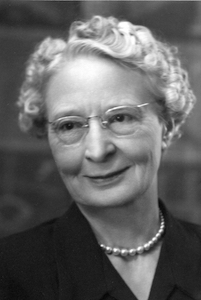Born in Montréal, April 20, 1887, Margaret Newton (Ph.D) grew up on a farm in western Quebec. In 1918, she graduated with a Bachelor of Science in Agriculture, the first woman to complete all the degree requirements at Macdonald College and one of the first women in Canada to earn a degree in agriculture. She followed this with a Master of Science in 1919, also from Macdonald College. She completed doctoral studies at the University of Minnesota and graduated in 1922, becoming the first Canadian woman to earn a Ph.D. in agriculture.
Dr. Newton began her career in research as an associate professor of biology at the University of Saskatchewan. In 1925, she moved to Winnipeg to join the Federal Department of Agriculture’s Dominion Rust Research Laboratory as a senior plant pathologist. She initiated annual stem rust surveys in western Canada and thereby demonstrated the diversity of races that existed in rust populations. Her identification and description of the many distinct races of rust contributed enormously to the body of scientific information required for the breeding of rust-resistant grains. Her research and publication of more than 40 scientific manuscripts played a substantive role in the control of wheat stem rust, a disease which destroyed at least 30 million bushels of wheat a year in western Canada.
Dr. Newton’s contributions to science and agriculture brought her an international reputation, and her expertise was sought by rust researchers in other grain-growing countries around the world. During her career, she represented Canada several times at international scientific conventions in the U.S., Europe and Russia.
A renowned scientist, Dr. Newton received awards at the national and international level. She was elected as fellow of the Royal Society of Canada in 1942, only the second woman to be so honoured. In 1948, she was awarded the Royal Society’s Flavelle Medal, the first woman and also the first graduate of an agricultural college so honoured. In 1956, the University of Minnesota presented her with its Outstanding Achievement Award, and in 1969, the University of Saskatchewan awarded her an honorary Doctor of Laws. She was inducted into the Canadian Science Hall of Fame in 1991.
Dr. Newton retired early due to poor health, likely brought about by long exposure to mould and rust spores. Farmers and the prairie grain industry successfully petitioned the government of the day to grant her full pension in recognition of the millions of dollars her work had saved them.
Dr. Margaret Newton is remembered as an important contributor to Canada’s world-renowned wheat industry. As a pioneer in agricultural research, she made a significant contribution to the economy of western Canada.


